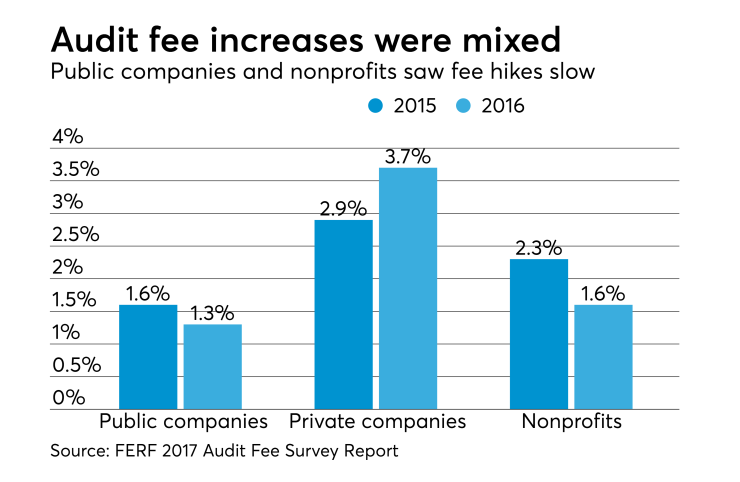Increases in audit fees for public companies and nonprofits slowed down in 2016, according to a new report, although private companies saw an uptick in their fee increases during the 2016 audit season.
The annual

Broader data from the Securities and Exchange Commission compiled by MyLogIQ found that median increases fell across all types of filers. Large accelerated filers had increases of 3.4 percent in 2016 compared to 4.2 percent in 2015, accelerated filers saw increases of 2.5 percent in 2016 vs. 3.97 percent in 2015, and non-accelerated filers had increases of 2.4 percent in 2016 versus 2.7 percent in 2015. Smaller filers had increases of 2.4 percent in 2016 as opposed to 2.7 percent in 2015.
Overall, 2,120 registrants (or 33 percent) saw an increase in their audit fees, while 36 percent (2,296 registrants) reported a decrease in audit fees.
Accelerated filers experienced lower fee increases than non-accelerated filers. Accelerated filers overall reported an increase of 0.2 percent in 2016, while non-accelerated filers reported an increase of 3.0 percent.
Companies were able to lessen their audit fee increases by improving their own internal controls, planning and preparation. Those improvements enabled auditors to review transactions during the course of the year and helped companies negotiate rate increases with audit firms for the work involved. Changing outside audit firms also helped mitigate fees.
“Organizations of all types continue to prepare for the implementation of new accounting standards and take advantage of opportunities to conduct strategic transactions," said FEI and FERF president and CEO Andrej Suskavcevic in a statement. "These factors continue to be primary drivers of audit fees. However, this year’s research shows that by implementing best practices internally and alongside auditors, fee increases can be mitigated. We look forward to working with our membership to help them continue to improve audit preparation and make the audit process as smooth and cost efficient as possible.”
Some companies saw their audit fees go down in 2016: 47 public companies, 40 private companies and 15 nonprofits. Among the public companies seeing lower audit fees, the most common tactics they used to control costs included enhancing internal controls, increasing audit preparedness and reviewing audit focus areas. Among private companies, they cited increasing audit preparedness, reviewing audit focus, enhancing internal controls and negotiating with auditors as their way to lower audit fees.
The range in hourly rates for auditing narrowed. Survey respondents reported a median rate of $216 and an average rate of $225 in 2016, compared to $193 and $268 in findings in 2015.
The audit fees paid by 161 public companies responding to the survey averaged $7.4 million, with a median fee of $2.8 million. The average percentage increase in audit fees reported was 6.9 percent, while the median percentage increase was 1.3 percent. Acquisitions and new FASB revenue recognition standards led the way among the reasons cited for audit fee increases, at 71 and 60 percent, respectively.
Increased M&A volume contributed to higher audit fees for almost three-fourths of the 80 public companies that reported fee increases for their 2016 audits. Survey respondents said acquisitions led to higher fees both in terms of costs related to a transaction—valuation, due diligence and post-merger integration support—along with higher ongoing costs associated with auditing a larger entity after the transaction closed.
Audit fees paid by the 281 private companies that responded to the survey averaged $163,993, with a median fee of $70,000. The average percentage increase in audit fees within this group was 3.8 percent, while the median increase was 3.7 percent.
For private company respondents, inflation was the leading factor cited for audit fee increases, with 48 percent of respondents citing that reason. That was followed by acquisitions at 28 percent. Unlike their public company counterparts, new FASB and revenue recognition standards were less of an influence on audit fees, although this is likely to change as private entities prepare for the 2019 adoption of the new revenue standard.
Of the 56 nonprofit organizations that responded to the survey, they experienced average 2016 audit fees of $181,403. The median audit fee for nonprofits was $52,388. The average percentage increase in audit fees they reported was negative 2.3 percent in 2016, a significantly lower proportion than 6.2 percent for 2015. The median increase in audit fees for this group was 1.6 percent. A little more than half (56 percent) of nonprofit survey respondents said inflation was the main factor behind comparatively modest increases in audit fees.





